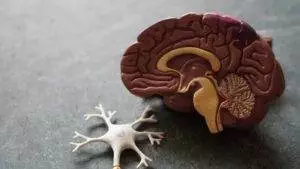-
 Art of Wellness Acupuncture & Traditional Chinese Medicine (TCM)11704 Wilshire Blvd, Suite 295, Los Angeles, CA, 90025
Art of Wellness Acupuncture & Traditional Chinese Medicine (TCM)11704 Wilshire Blvd, Suite 295, Los Angeles, CA, 90025
myartofwellness@gmail.com310-451-5522 Office Hours
MonClosedTue7:30 am --4 pmWed7:30 am --4 pmThu7:30 am -- 4 pmFri7:30 am -- 4 pmSat7:30 am -- 4 pmSunClosedOur office opens from Tuesdays to Saturdays 7:30 am to 4 pm, will be closed on Memorial day, Independent day, Labor day, Thanksgiving day, Christmas and New year.
-
Recent Posts
- Acupuncture for Sciatica Pain
- Can Acupuncture Help With Bladder Control?
- How to Treat De Quervain’s Tenosynovitis With Acupuncture and TCM
- Chinese New Year 2026: Year of the Horse
- Acupuncture and TCM Treatment for Perimenopause Symptoms
- How to Treat Insulin Resistance With Acupuncture and TCM
- How to Treat Metabolic Syndrome With Acupuncture and TCM
- How to Treat Syncope With Acupuncture and TCM
- How to Treat Thoracic Outlet Syndrome With Acupuncture and TCM
- How to Treat Dupuytren’s Contracture With Acupuncture and TCM
- How to Treat Nutcracker Syndrome With Acupuncture and TCM
- How to Treat Rosacea With Acupuncture and TCM
- How to Treat Perioral Dermatitis With Acupuncture and TCM
- Lymphatic Drainage With Acupuncture and TCM
- How to Treat Turf Toe With Acupuncture
- How to Treat Nerve Pain With Acupuncture and TCM
- Sign up to receive news and updates and get my free report:“The Top 10 Reasons to Try Acupuncture”

February 2026 M T W T F S S 1 2 3 4 5 6 7 8 9 10 11 12 13 14 15 16 17 18 19 20 21 22 23 24 25 26 27 28
Liver
How to Treat Hives With Acupuncture and TCM
By Qineng Tan, L.Ac., Ph.D. & Xiaomei Cai, L.Ac., Ph.D.
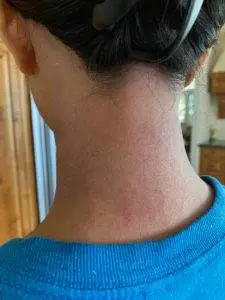
Skin rash with itchy welts or red bumps that seem to appear suddenly, then move to another part of the body, or go away? Hives, also known as urticaria, are caused by a type of allergic reaction that creates a temporary rash or swelling of the skin. TCM and acupuncture have been used for centuries to help relieve hives caused by allergies.
Hives are fairly common, occurring in about 20% of people of all ages. An acute, or short-lived, case of hives may occur because of being exposed to some unusual, new chemical or natural irritant in a person’s environment, maybe in some product, or some pollen or bug. These usually go away quickly, and it may be fairly obvious what it was that caused the outbreak of hives. However, sometimes people develop chronic idiopathic urticaria (CIU), in which a person may break out in hives often on an ongoing basis and have no idea why it keeps happening.
Allergies can manifest in many ways: sometimes causing sneezing, watery eyes, or skin problems. Hives are another way that an allergic reaction can show up. Hives, or urticaria, are distinguishable from other types of skin rash, like dermatitis eczema, or shingles rash, because, unlike other rashes, they do not form fluid-filled bumps or cause dryness, scaliness, or cracking of the skin. Rather, hives are raised welts on the skin that appear red, but then turn white when you press on them; this is known as “blanching.” Hives can look like small, narrow lines, or big, patchy blotches.
Urticaria is related to, and sometimes confused with, angioedema, which is a similar condition, in which deep layers of skin become swollen, often around the eyes and mouth, also due to irritation by some allergen. Angioderma can coexist with hives, and can be more dangerous than hives, if it causes tissues in the throat or tongue to become so swollen that the airway is blocked.
Hives often clear up on their own within a few days or weeks without any treatment. However, some people develop chronic hives, in which the hives rash keeps recurring for weeks or months, or longer. Chronic hives can be a uniquely painful and frustrating condition; never knowing when you might break out into a burning, itchy rash. Hives worse at night or hives worse after sleeping are common experiences for people who suffer from chronic urticaria. Breaking out in hives can make a person feel panic, making it very difficult to get on with daily tasks. Acupuncture treatment can help alleviate the burning and itching of acute hives or chronic hives, and help relieve the allergies, stress, and other underlying conditions that bring them on.

Top 10 Hives Causes or Triggers
In general, what causes hives most of the time is an allergic reaction to some external stimulus. Touching something, eating something, or inhaling something that you are allergic to can cause urticaria to break out on the skin, sometimes briefly, sometimes moving around from one area or the skin to another, or seeming to spread over the skin. Things that can cause hives include:
- Foods, especially those that are well-known allergens like nuts, shellfish, dairy, and eggs, but also fruits, especially citrus fruits
- Contact with certain plants
- Pollen in the environment
- Medications, including antibiotics, OTC pain relievers
- Latex
- Pet dander
- External stimuli from the climate – sun exposure, heat, cold
- Bacterial infections in the body, like strep throat or a UTI
- Viral infections in the body, like colds, hepatitis or mononucleosis (viral hives)
- Blood transfusions
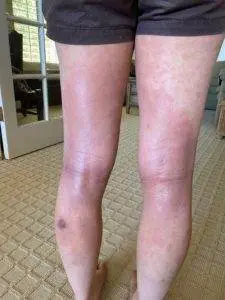
Insect bites or itchy rashes that cause you to scratch at your skin can also cause hives to appear in other areas. Simple pressure on the skin, from sitting or leaning on a patch of skin for a long time, can cause hives. Some people break out in hives when they are under a lot of pressure or emotional stress, even if they are not aware of having allergies or other underlying causes for hives. Sometimes this is called a “stress rash.”
Treatment for Hives
Hives are most commonly treated with antihistamines, which can help relieve itching. Many people experience some type of side effect from taking antihistamines, including: headache, drowsiness, fatigue, and hay fever type symptoms. Some people do get relief from a temporary hives rash after taking Benadryl or something similar. But for others, it may not help, and then doctors often prescribe a corticosteroid as an anti-inflammatory. If steroid treatment for hives does not help, immunosuppressants may be recommended. Depending on the root cause of the hives, these types of pharmacological solutions may or may not work to relieve hives. Acupuncture and TCM treatment focuses on solving the deeper problems that cause hives, without any negative side effects.
How Can Acupuncture Help Hives?

As we have seen, conventional western medicine mostly looks at hives in terms of allergies. But in order to resolve the hives, we have to look more closely at why a person has those allergies. Why are some people affected so strongly by certain foods or certain environmental conditions while other people are not affected at all? We have to consider a person’s constitutional health.
As we have discussed in other articles, in TCM the concept of Wei Qi refers to the body’s protective defenses, the action of which stems mainly from the lungs and the skin. Many types of illness are considered to be related to a weakness or breakdown in the Wei Qi that allows external pathogenic factors to enter the body and take hold. Wind is one such external pathogenic factor. Heat and cold are others. Viral and bacterial infections also find their way into the body when the Wei Qi energy is weakened.
6 Pathogenic Factors According to TCM:
- Wind
- Cold
- Summer Heat
- Dampness
- Dryness
- Fire
Hives come mostly from wind and heat. In TCM, urticaria is known as Feng Zhen Kuai, or “wind rash patch.” Wind describes the nature of urticaria rash in the sense that the hives welts come and go, as if blown about.
When people get hives, it is usually because of one of a few common factors.
- Yin deficiency/Dryness – If the body is too dry, when any allergens get in, there is not enough moisture in the body to wash them out of the system; this causes the breakout.
- Fire/Heat – If there is too much heat, fire, and inflammation in the body, when there is exposure to allergens, the body can’t take any more and will break out.
- Liver stagnation with Heat – When a person is under stress for a long time, it can exacerbate stagnation of Qi in the liver system, which over time causes heat to build up, then the body cannot process little irritations. The liver and kidneys have to do all the work to filter toxins out of the body, but when those organs are overstressed, the body will try to get rid of excess heat through the skin.
Usually, if a person is having chronic hives, it has a lot to do with their food and their habits around their exposure to the elements. For example, in the winter time, in order to be harmonious with the season, the body is meant to experience cold. But many people keep the heater on and keep their environment very warm all the time. This leads to dry air and can cause even people without any allergies to feel itchy. People also tend to take long, hot showers, which can destroy some of the skin’s natural protective layers and cause it to be raw and easily irritated.
In western thought, when a person has a reaction such as hives to certain foods (spicy foods, alcohol), it is thought of as an allergic reaction, but in Chinese medicine we see this as being the body’s reaction to too much heat. If a person already has a fiery constitution, or liver stagnation, and then there are external hot conditions, and hot foods coming in all at once, the internal heat can explode out, creating the burning rash on the skin.
Cupping can be very helpful for treating hives; it exfoliates the skin and helps to draw toxins out. This will help to cool down the hives outbreak. Then we go further with acupuncture and herbs to strengthen the lungs, the liver, and the Wei Qi.
A systematic review of clinical trials studying the use of TCM methods and acupuncture to treat hives, both as an alternative and an adjunct to medication treatment, concluded that acupuncture is a safe and effective way to reduce symptoms of hives or chronic urticaria. Chinese herbs are also well-known for helping to relieve hives.
Top 5 Tips for Hives Relief

How to get rid of hives for good will mean paying attention to what triggers the rash for each individual. To avoid this kind of allergic reaction hives, protect your Wei Qi with healthy habits. Prioritize rest and good nutrition to build up your immunity and protect your lungs and skin.
- Avoid a cold wind blowing on you, whether outside, or from a fan or air conditioner. Dress appropriately; always bring an extra layer so you don’t catch a chill or have a bright sun shining on your skin for a long time when you didn’t expect it.
- Avoid very hot showers, baths, saunas, etc.
- Engage in regular exercise to help boost your blood circulation; walking is always ideal. This will help to reduce stress, as will a meditation practice.
- Get plenty of rest. Good quality sleep is essential to help build up the Wei Qi.
- Avoid foods that are either too hot (spicy or fried, red meats) or too cold (raw foods). No alcohol or coffee. These triggering foods and beverages can really make the hives worse. Drink more water to eliminate the dryness in the body.
If a patient is having trouble figuring out what it is that is causing his or her hives breakouts, a TCM provider may be able to find the underlying reason behind the rash.
Acupuncture Near Me for Hives
People of all ages can receive acupuncture treatment for hives and allergies like hay fever. The doctors at Art of Wellness have been helping people get relief from allergies and itchy skin conditions for over three decades. We can provide help for children with hives with herbs and acupuncture. If you or someone you love is suffering from hives, please consider giving TCM and herbs a try.
*This article is for education from the perspective of Traditional Chinese Medicine only. The education provided by this article is not approved by FDA to diagnose, prevent, treat and cure human diseases. It should not stop you from consulting with your physician for your medical conditions. Traditional Chinese Medicine is based on Qi, which is an invisible force that usually cannot be observed by modern science. Because science focuses on testing ideas about the natural world with evidence obtained through observation, these aspects of acupuncture can’t be studied by science. Therefore acupuncture and Chinese herbs are often not supported by double-blind, randomized trials, and they are considered alternative medicine therapies in the United States.
What is Multiple Sclerosis and How to Manage MS with TCM & Acupuncture
Multiples Sclerosis is autoimmune disease, Traditional Chinese Medicine & Acupuncture are very helpful to improve these condition.
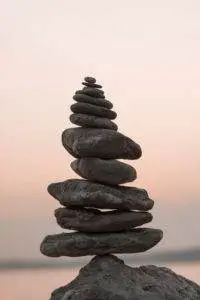
Dr.Tan’s Case and Testimony
Mr. M- a healthy 50-year old Caucasian gentleman—first visited my office Art of Wellness Acupuncture a few years ago. As an attorney, he had been working very hard to support his two daughters, who were both in college. About four months ago, the onset of serve lower back pain along with tingling in his left leg changed his life completely. He saw several doctors, had a number of x-rays and an MRI which revealed a moderate bulging disk on L4-L5. He tried different pain pills, NSAIDs, and underwent three months of physical therapy, none of which had helped. Recently, he had been experiencing numbness and weakness in his left leg, and was suffering from depression due to his inability to carry on with daily work and regular activities. When he talked to me, I noticed that he constantly rubbed his eyes. I asked if he felt any abnormalities in his vision. He answered yes, and that he had periodic occurrences of blurred vision. When I suggested that he showed me how he walks, I noticed his poor balance. He tended to fall on his left side because his left leg did not seem to follow his motion. Then I checked his knee and ankle reflex and found that they were excessively active. I was almost certain that the condition that made him suffer so much in the last few months was not a simple bulging disk or sciatica; it was a disorder of the central nervous system-Multiple Sclerosis. Immediately, referred him to a neurologist and suggested that he have a brain and cervical MRI. Two weeks later, he came back to my office with a confirmed diagnosis of Multiple Sclerosis.
Mr. M. is just one of 200 patients who are diagnosed with MS every week in the United States. There are about 400,000 people in the U.S. and 2.5 million patients who are suffering from this disease in the world.
Cause of MS
MS is an autoimmune disease in which infections or environmental changes can confuse the body’s defense system. Sometimes a foreign antigen mimics a group of the body’s own proteins. When the immune system response by mounting an attack against these foreign invaders, it inadvertently destroys the foreign antigen along with any similar antigens, including the body’s own tissues.
A recent study shows that a virus called adenovirus type 2 looks remarkably similar to the composition of the protective covering around the spinal cord and parts of the brain—the myelin sheath cells. The attacks of the immune system of this virus along with the mistaken attack on the myelin sheath is believed to be the ultimate cause of multiple sclerosis。
Common symptoms of MS
- numbness or tingling, usually in the leg or arm
- muscle weakness
- dizziness
- spasticity
- pain (moderate to severe)
- Ataxia
- Tremor
- Slurred speech
- Blurry, double vision or blindness
- bladder malfunction
- bowel dysfunction
- sexual dysfunction
- depression
- euphoria
- cognitive abnormalities
- fatigue
Most commonly, MS first manifests itself in a series of attacks followed by complete or partial remission as symptoms mysteriously lessen. These symptoms, however, will return later after a period of stability. This is called relapsing-remitting (RR) MS.
Treatment of MS
Unfortunately, there is no cure for MS yet. In Western Medicine, the treatment focuses mainly on decreasing the rate and severity of relapse. Beta interferons, anti-cancer drugs (to weaken the immune system), and steroids are commonly used for the treatment of MS. These medicines can reduce the number of MS lesions, delay the progression of the disease, and provide symptomatic relief for the patient.
In TCM, a condition called “Wei Syndrome” with symptoms similar to MS, was documented 2000 years ago in a classic Traditional Chinese Medicine book called Emperor Classic Medicine. Acupuncture and Traditional Chinese Medicine has been involved in the treatment ever since. MS patients who have tried acupuncture report improvement in pain, spasticity, numbness and tingling, fatigue, depression, anxiety, and bowl, bladder function.
Maintaining a healthy lifestyle is very important for the MS patient. This includes:
- Getting enough time to sleep and rest. Go to bed early
- Exercise regularly. Tai Chi and Yoga are very good to help patient relax, balance and with muscle strength
- Balanced diet, a lot of vegetables and enough protein from white meat
- Stress management
- Daily meditation and positive thinking
- Staying connected with friends and joining a support group
- How to reduce and prevent inflammation
Patient Story- Gilly
I was diagnosed with Relapsing Remitting MS in 1991 and I had no idea what a crazy, unpredictable journey I was about to embark on.
I woke up one morning, tried to get out of bed but my legs were like jello, I had no balance and had double vision.
I was given a spinal tap and MRI and lesions were detected on my brain & cervical spine.
When first diagnosed, my neurologist put me on one of the few FDA approved medicines for MS which don’t cure the disease, but delay the progression. For that I inject myself daily and have done so for 17 years
For the first 7 years after being diagnosed, I experienced relapses (flare up of symptoms) on average twice a year. The treatment for relapses was a 5 day course of steroids administered through IV, followed by 12 days of oral steroids.
The relapses affected my motor skills the most, especially walking but after a treatment of steroids, I was almost as good as new.
My friends suggested I try acupuncture. I was recommended to Dr Tan because he had studied MS in China. *
Dr Tan has been monumental in my life. He has given me treatments for a multitude of injuries I’ve suffered over the years due to frequent falls and is an expert in pain relief. He treats me for stress relief which contributes my general wellbeing. Dr Tan is very knowledgeable about Western medicine and MS treatments so I always ask his opinion.
I’ve been diagnosed with MS for 21 years and feel fortunate that Dr Tan has been treating me for a large part of that time. Although I partake in Western medicine, I know that Western medicine only treats the symptoms but Eastern medicine treats the cause of the symptoms.
My MS has progressed to the stage that I now use a wheelchair full time.
I go to acupuncture for preventative care. My immune system needs extra help especially during cold & flu season.
I am very aware that MS is a ‘designer’ disease, and no two people have the exact same symptoms. I would encourage anyone with MS to avoid stress, keep up a healthy immune system and try to stay positive and happy, because your emotional state affects your physical being.
How to Reduce and Prevent Inflammation
How to Reduce and Prevent Inflammation
We usually think of inflammation as something that affects our muscles and joints, causing them to swell and ache. We observe these manifestations when people are injured causing knee pain or elbow pain from injuries like an ankle sprain. This suffering from pain and tenderness is actually our body’s normal protective response to restrict our body from further activity to cause more injury. For those acute inflammation incidences, we need to temporally put pressure near the heart end and apply ice to the injured area to discontinue bleeding and swelling. With time, we expect our body to reduce the inflammation and resume as normal. However, there are some conditions when the body is in a constant low grade heat or chronic inflammation, like rheumatoid arthritis, psoriasis, or celiac disease this is even observed with kidney stone, gall bladder stones, and high cholesterol.
Cancer is another disease linked with chronic inflammation/toxins. Over time, chronic inflammation can cause DNA damage and lead to some forms of cancer, according to the National Cancer Institute. More recently, science has made it clear that inflammation is also part of what causes poor blood flow through the arteries, causing problems in the body’s circulator system and the heart. Obesity and unhealthy eating habits can increases inflammation in the body. Autoimmune disorders like Lupus, Multiple Sclerosis can cause chronic inflammation in healthy and unhealthy people. But really, the root cause of inflammation is a dysfunction of the metabolism, or digestive process. It is the body’s normal defensive response to excess internal heat.
In Traditional Chinese Medicine, there are two energy measurements: Yin and Yang; which is present in everything. Yin represents cold, water, dark….and Yang represents hot, fire, light…..both energies need to be balanced in order to keep everything in shape. In our body, our organs need fire/heat to keep our body temperate normal and operate every part of the body well. However, if the fire is too strong, that will cause fever or infection or inflammation. In Chinese, fire is 火 (pronounced huo), inflammation is 炎(pronounced yan). As you can see, 炎 has two 火, means too much fire or excess heat.
Excess heat can be caused by stress, too heavy of a diet, and eating the wrong kinds of foods, and extreme environmental heat.
How to reduce and prevent inflammation?
Stress management is an important part of our daily task especially at the end of the day, we are able to unwind ourselves, release tension, and allow energy to flow. When there is ongoing or long term stagnation that is unaddressed, excess heat/toxins will be generated. Having acupuncture treatment regularly always helps people de-stress, calm the mind and body and achieve anti-anxiety. Once the whole body’s Qi/blood is flowing freely, the stagnation opens up, heat is reduced, and the inflammation will disappear. On top of acupuncture treatment, cupping is very helpful to clear excess heat and detoxify the body.
An anti-inflammatory diet is essential along with a low calorie diet. The meaning of “calorie” is, after all, a unit measurement of heat or energy. Simply put, ingesting more calories creates more heat in the body. If the calories aren’t being burned through physical activity, then they are stored in the body as excess fat. Fat not only weighs you down, but triggers the immune system, which tries to attack the fat as if it was a foreign substance. Carrying excess fat acts on several levels to create detrimental inflammation within the body, causing more Qi/Fluid blockage and that blockage creates more inflammation.
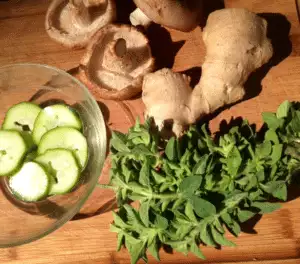
Second, anti-inflammation diet is cool or cold food. If you are an Art of Wellness member, you know what group of food you should stay on, either cooling food, like majority of vegetable, and fruit or add more warm/hot food kale, mustard green, turkey, walnut, black bean, ginger pecan, lamb to tonify your Yang. Besides of working on appropriate diet, having herbal supplements is very especial assisting reduce inflammation. Cause herbs are from plants, carry stronger energy than our food. Due to the poor taste, we do not consider eat them like other vegetable. It is important to pay attention not only to what you eat, and how much, but also how you eat, and when. Many people’s eating habits lead to poor digestion.
Eat sitting down. The body draws both blood and Qi into its center – the stomach and spleen – in order to digest food. Eating while standing or walking, or trying to concentrate on some other problem, draws much-needed energy to the extremities or the brain, away from the digestive process. And also , should eat in a relaxed environment avoid arguing.
Chew food thoroughly. Failure to chew adequately means that the rest of your digestive system has to work harder to break down your food into usable nutrition.
In general, choose more fresh, raw, and lightly cooked foods, and avoid baked, fried and heavily processed foods. These foods retain the heat energy that was used in their preparation, and that creates more heat inside you.
Increase your use of bay leaf, cilantro, dill and other herbs like rosemary, thyme, and oregano, all of which have anti-internal heat properties. Choose high Omega-fatty-acid fish such as salmon, and good quality fish oils. Eat lots of leafy greens. Avoid coffee, and drink green tea instead. Fermented foods such as pickles, sauerkraut/kimchee, miso and tempeh help to heal and promote good balance in the intestines. Shitake mushrooms are a source of copper, a rare nutrient, important in the prevention of arterial inflammation.
It probably comes as no surprise that we recommend cutting back on unhealthy fats (trans fats, processed cooking oils, and fatty red meat). And avoid sugar as strictly as possible, as sugar consumption leads to insulin resistance and is a major cause of inflammation.
Avoid the nightshade vegetables: peppers, eggplants, potatoes and tomatoes. This includes spices and seasonings made from peppers, such as paprika and red pepper flakes. These foods can irritate the intestines, affecting their permeability and setting off unwanted immune responses. These in turn lead to inflammation, muscle spasms and stiffness.
What to Eat to Beat the Heat/inflammation
In Chinese culture, we drink mung bean soup during the hot days of summer. Cooked mug beans cool down our internal body heat and detoxify the body. We even feed this soup to people who are suffering from heat strike. Mung Beans are very nutrition, offering easily digested proteins, and do not create gas like other beans can. Their natural sweet flavor and bright green color are pleasing, as well.
Try this simple recipe:
- Add one cup of mung beans to six cups of water
- Bring to a boil, simmer for 5-10 minutes
- Sweeten by adding Asian pear or add a pinch of salt and eat as a soup or tea.
- Or simply one table spoon of mung bean with two cups of boiling water, cover with lid, drink this tea when it is in room temperature. Refill two cups of water boiling water again in remained mung bean container, repeat 2-3 time, eat the mung bean at the end.
To ice or not to ice?
In the early hours of the morning, it is always best to drink liquids that are body or room temperature, in order to protect the fire of the digestive system. In the afternoon on a very hot day, it is generally OK to have a cold or iced drink to refresh yourself. However, women who are about to have or who have their menstrual period should never drink ice-cold beverages. The stomach sits right above the uterus, and the action of cooling down the female organs too much can cause cramping. And of course, we would always advise against drinking sugary iced coffee drinks, which can actually cause dehydration.
